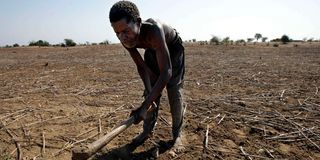FAO gives Sub-Saharan African countries chances to tackle climate crisis

A Malawian farmer works on his farms in 2015.
Sub-Saharan African countries could easily respond to the climate crisis by making good use of the opportunities offered by the Food and Agriculture Organization (FAO) to fight food insecurity.
According to Valere Nzeyimana, Senior Water Development and Management Officer (FAO) Regional Office for Africa some of the readily available opportunities include improved water control and watershed management in a rain-fed environment.
Others are solar-powered irrigation systems, water access technologies and water governance and farmer-led irrigation and small-scale irrigation technologies.
“FAO is ready to engage into a partnership to the development and consolidation of inter-sectoral partnerships at the global and regional levels, and their declination to the national level representations in favour of the mobilisation of funding including strengthening the food-water-energy-environment security link,” said Mr Nzeyimana.
The official was speaking recently on the key topic titled “Water Management for Sustainable Agriculture Production” during a workshop on water issues in Africa for East African journalists in Nairobi.
The workshop organised by Africa21 and Water Diplomat was attended by 20 journalists from Kenya, Uganda, Tanzania and Ethiopia.
“Sustainable use of water resources requires holistic, integrated and concerted long-term planning. Available water technologies should be adapted to the local context and made affordable to users according to their socio-economic situation,” said the official.
At the same time, he recommended that all programs and projects should target multipurpose use of available water resources saying “it is in that sense that all programs should target the improvement of the efficiency and diversity of water use and the productivity of agricultural systems for Food Security and Nutrition.”
Mr Nzeyimana said all available sources of water should be considered even if it requires long-term sensitisation for mindset change and adaptation.
He said by 2050 the area experiencing water shortage in Sub-Saharan Africa will increase by 29 per cent. The World Bank estimates that the number of African countries experiencing water stress will rise to 18 and will affect about 600 million people on the continent.
“Due to the transboundary nature of many water basins, conflict over water resources will be exacerbated,” said the FAO official.
Other projected impacts of climate change in Africa include slow growth as developing countries are highly dependent on water for growth and development.
“Many developing countries have a low investment in irrigation systems, dams, and groundwater and do not have enough water storage to manage demand,” he added.
He observed that discharge reduction for the largest African water basins like Niger, Chad and Senegal could be as high as between 40-60 per cent.
The official revealed that the current situation in Africa indicates that only seven per cent of arable land is irrigated, with an even lower four per cent in sub-Saharan Africa while 93 per cent of the African farmers rely on rain-fed agriculture for their livelihoods.
“Agricultural growth is key to reducing poverty in Africa and driving economic development. Africa is well endowed with water resources, yet water withdrawals are less than three per cent of total renewable resources,” he said.
He called for additional investment in agricultural water management saying this would pay great dividends.
He said building water resilience in Sub-Saharan Africa requires good practices on water development, conservation and management, establishing appropriate infrastructure at the appropriate levels, coordination of institutions’ activities and harmonisation of water-related policies and strategies, and establishing and strengthening water users’ associations and water boards for proper water governance.





